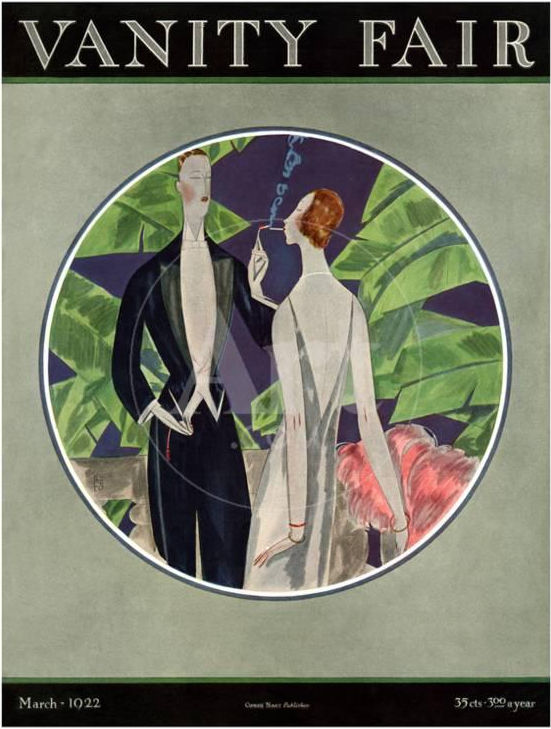 Vanity Fair, March, 1922
Vanity Fair, March, 1922
A Motion Picture Dictionary
DIRECTOR, n. A gentleman whose principal equipment consists of a megaphone, put tees, riding breeches, a sport shirt, a cavalry man’s wrist-watch, and a bottle of brilliantine.
DISGUISE, n. A slight alteration in a person’s appearance which is immediately penetrated by every member of the audience, including the children, but which completely deceives his most intimate friends and relatives.
DISHONESTY, n. A quality which characterizes any person with a moustache, Burnsides, Van Dyke, Dundrearys, Tolstois, Galloways, imperial, Governor Hugheses, or other hirsute decoration of the face.
DOCTOR, n. A middle-aged gentle man in a frock coat, who, whatever a person’s malady, first lifts up the patient’s eyelid, gazes ominously beneath, and sends for a basin of water.
DOUGH, n. A substitute for custard valued possession, and the one inconpie. testable source of its greatness.
DRAWING-ROOM, n. A room approximately the size of a three-ring circus tent, filled with various types of period furniture, and used exclusively for holding costume balls.
DRY, adj. The condition of a heroine’s Ruc-de-la-Paix gown immediately after the lady has been rescued from drowning
DUAL, adj. The kind of role offers a double opportunity for bad acting, and is therefore doubly popular with the profession.
EMINENT, adj. (1) A designation for bad actors to distinguish them from passable actors, who are always designated as “great.” (2) Any author who writes for the screen.
EMPLOYER, n. A repulsive gentleman who endeavours to woo every poor and virtuous young lady who applies to him for a job.
ENDING, n. That moment wherein a certain fortuitous and artificial concatenation of circumstances results everyone being temporarily happy.
ENOUGH, adj. Two reels.
EUROPEAN, n. Any man with a monocle or an Inverness coat.
EVENING, n. That time of day when everything and everybody has turned a pale Alice blue.
EVIDENCE, n. The false testimony and misleading circumstances on which noble young men with picked eyebrows and polished hair are convicted of crimes they did not commit.
EXIT, n. An elaborate piece of stage business consisting of (1) walking to door, (2) pausing with hand on knob, (3) partially opening door, (4) turning around, (5) making a remark, (6) opening door wide, (7) making a gesture with free hand, (8) stepping to door sill, (9) placing hand on out-side knob, (10) again turning around, (11) bowing, raising eyebrows, or waving free hand, and (12) reluctantly disappearing.
EXPENSE, n. That of which the producer is proudest, and by which the public is most impressed.
FADE-OUT, n. A slow and protracted means of relief, as distinguished from the “cut,” which gives immediate relief.
FARM, n. A bucolic residence one visit to which is sufficient to infuse the blackest and most vicious of natures with an almost unearthly purity.
FEEBLE, adj. The mental and physical condition of all indigent parents over forty.
 FOUNTAIN, n. A large basin of water into which a gentleman in evening clothes invariably precipitates himself during the course of a gay party.
FOUNTAIN, n. A large basin of water into which a gentleman in evening clothes invariably precipitates himself during the course of a gay party.
FRENCHMAN, n. Any man who elegantly kisses a lady’s hand when making his adieus.
FUTURE, n. The cinema’s most valued possession, and the one incontestable source of its greatness.
GAIETY, n. The emotion aroused by a young lady in Greek draperies suddenly emerging from a huge cake.
GENTILE, n. The mere salaried employees of the motion-picture industry,
GENTLEMAN, n. Any man in from form-fitting evening clothes and white kid gloves, who polishes his hair and which works his eyebrows up and down while talking.
GOWN, n. An exclusive French creation worn by a leading lady when enacting the role of a penniless and starving orphan,
GREAT, adj. A word which, through promiscuous application to screen productions, has come to have no meaning whatever, and is therefore insusceptible of definition.
 HAREM, n. A collection of maidens, whose sole duty is to amuse their lord and master with pseudo-classical dance steps.
HAREM, n. A collection of maidens, whose sole duty is to amuse their lord and master with pseudo-classical dance steps.
HEAVEN, n. A rustic dell, recently mowed, with several young ladies, draped in cheese-cloth, tripping about on their toes,
HERO, n. That member of the cast who deliberately and unflinchingly faces marriage with the leading lady,
HUT, n. A small cabin not over ten by twelve, containing a living-room forty feet square, two large bed-rooms, a kitchen, and numerous spacious closets.
IMMACULATE, adj. The only kind of conception permitted by the censors.
INGÉNUE, n. A putatively young female with blonde curls, who, by way of revealing her playful nature, twists the top-hair of middle-aged gentlemen into upstanding spirals,
INJURY, n. A physical mishap from which the virtuous recover and the unrighteous die.
ISLAND, n. A piece of land covered with palm trees, where the survivors of shipwrecks are washed up in pairs — one pair at a time.